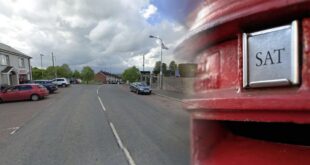News
National action is the most effective form of resistance
Sunday 29 January 2023
Issue 2840
PCS strike at the DVLA in Swansea in January with Geraint Davies MP joining the pickets (Picture: PCS union on Twitter)
Workers at the British Museum in London, the Driver and Vehicle Licensing Agency in Wales, and some jobcentres and benefits offices in north west England are set to strike.
The action, by members of the PCS union, is part of a fight over pay, pensions and jobs across the civil service.
Some 100 visitor service and security workers at the museum in central London are set to strike for a week at Monday 13 February.
And 60 workers at Driver and Vehicle Licensing Agency offices in Wales also plan to strike for five days from the same date.
The PCS says this will disrupt the printing of driving licences.
Meanwhile, workers at four jobcentres in Liverpool are set to strike every day except Sundays between Thursday of next week and Friday 3 March.
Some 500 workers at Department for Work and Pensions offices in Stockport and Bolton also plan to strike between Thursday of next week and Saturday 18 February.
The strikes are part of the PCS’s strategy of rolling, targeted action.
The union’s leadership says this is designed to cause maximum damage to the government, while limiting workers’ losses.
It comes after a series of strikes by workers including driving examiners, passport officers, highways patrol officers and Rural Payments Agency workers during December and January.
It’s also the follow up to the strike on Wednesday of this week, when around 100,000 PCS members across the civil service struck alongside teachers and university workers.
The union described the latest planned action as an “escalation”.
Yet it involves fewer workplaces than the last round of rolling action in December and January.
The best follow-up would be to build on that with more, and longer, strikes of the whole civil service.
- Legal advisers and court associates in more than 80 courts across Britain were set to strike for four days from Friday of this week until Monday of next week.
The workers are fighting after the rollout of a computer system called Common Platform that increases workload and stress and slashes jobs. They also struck on Saturday of last week.
- Workers at Hinduja Global Solutions (HGS) in Liverpool have settled a pay dispute after winning an improved deal through strikes.
Bosses at HGS, originally offered an increase of just 3.25 percent. After six weeks of strikes by PCS union members, they increased this to 10 percent over two years. It shows that striking can force bosses to budge.
But more could have been won through longer strikes.
PCS exec members call for wider, longer strikes
PCS union members on 1 February are striking, taking to picket lines and rallying across Britain. Union members are up for a fight.
This is the first time since our ballot closed in early November that the vast bulk of the 100,000 PCS members with a mandate to strike have been called out. It cannot be a one‑off experience.
The NEU for example is striking again on 15 March, the day of the budget, and 16 March. PCS should call all its members with a mandate out again on both those two days. We would hope to be joined then too by HMRC and other groups who are currently reballoting.
But such action is just the minimum required. We need a strategy that can overcome the determination of the government to avoid making concessions to our demands.
This requires a serious escalation of national action. Selective targeted action on its own with a couple of days of national strikes risks not placing enough pressure on the government to force them to cave in.
The UCU union has now called 18 days of strikes in addition to the three it has already taken on its current mandate.
This is the kind of scale of action the PCS must now urgently consider taking. We cannot let this chance to win our demands slip away from too cautious an approach.
Let’s be bold—and let’s win.
Sarah Ensor, Marianne Owens and Paul Williams Socialist Worker supporters on the PCS union national executive, writing in a personal capacity
Source link



